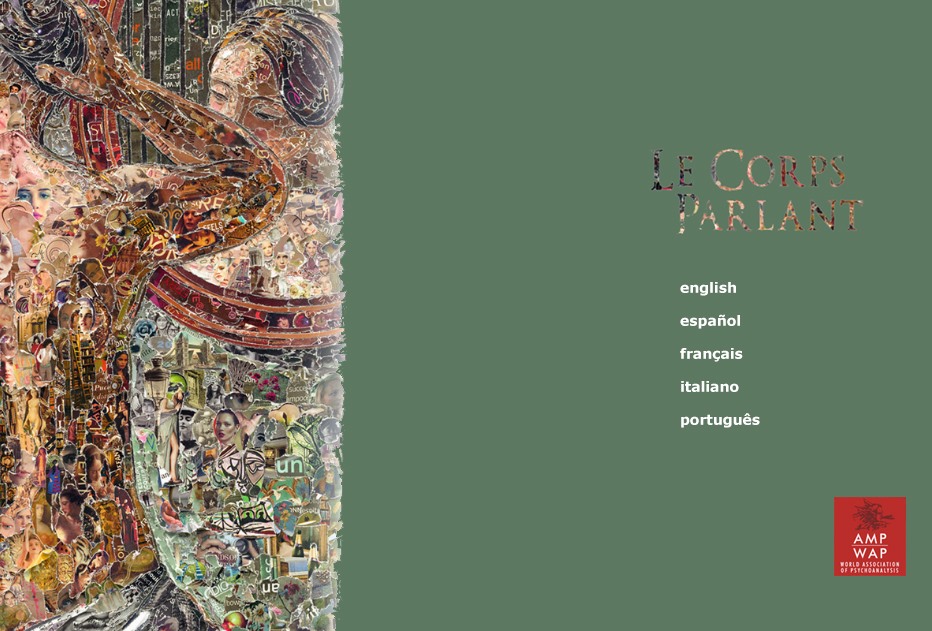

THE SPEAKING BODY
Xth Congress of the WAP,
Rio de Janeiro 2016
445
444
« Introductory Lectures on Psycho–Analysis » (1916 – 1917 [1915 –
1917]): Lecture XXII. [SE, XVI]
“Next, we must bear in mind that the sexual instinctual impulses in particular
are extraordinarily
plastic
, if I may so express it. One of them can take the place
of another, one of them can take over another’s intensity; if the satisfaction
of one of them is frustrated by reality, the satisfaction of another can afford
complete compensation. They are related to one another like a network of
intercommunicating channels filled with a liquid.”
p. 345
« The Ego and the Id » (1923). [SE, XIX]
“The transformation of object-libido into narcissistic libido which thus takes
place obviously implies an abandonment of sexual aims, a desexualization –a
kind of sublimation, therefore. Indeed, the question arises, and deserves careful
consideration, whether this is not the universal road to sublimation, whether all
sublimation does not take place through the mediation of the ego, which begins
by changing sexual object-libido into narcissistic libido and then, perhaps, goes
on to give it another aim.”
p. 30
I /c. Repression, Drive, Fixation
« Repression » (1915). [SE, XIV]
“We have reason to assume that there is a
primal repression
, a first phase of
repression, which consists in the psychical (ideational) representative of the
instinct being denied entrance into the conscious. With this a
fixation
is
established; the representative in question persists unaltered from then onwards
and the instinct remains attached to it.”
p. 148
« The Unconscious » (1915). [SE, XIV]
“Just as Kant warned us not to overlook the fact that our perceptions are
subjectively conditioned and must not be regarded as identical with what is
perceived though unknowable, so psycho–analysis warns us not to equate
perceptions by means of consciousness with the unconscious mental processes
which are their object.”
p. 171
“So, too, when it comes to describing primal repression, the mechanism just
discussed of withdrawal of preconscious cathexis would fail to meet the case;
for here we are dealing with an unconscious idea which has as yet received no
cathexis from the Pcs. and therefore cannot have that cathexis withdrawn from
it.”
p. 180-181
« The Ego and the Id »
(1923). [SE, XIX]
“The ego is first and foremost a bodily ego; it is not merely a surface entity, but
is itself a projection of a surface.”
p. 26
“At the very beginning, all the libido is accumulated in the id, while the ego is
still in process of formation or is still feeble. The id sends the parts of this libido
out into erotic object-cathexes, whereupon the ego, now grown stronger, tries
to get hold of this object-libido and to force itself on the id as a love-object. The
narcissism of the ego is thus a secondary one, which has been withdrawn from
objects.”
p. 46
« Inhibitions, Symptoms and Anxiety »
(1925). [SE, XX]
“It has been discovered as a general fact that the ego-function of an organ is
impaired if its erotogenicity –its sexual significance– is increased”
p. 8
“I came across an instructive example of this kind of intense, though short-lived,
general inhibition. The patient, an obsessional neurotic, used to be overcome
by a paralysing fatigue which lasted for one or more days whenever something
occurred which should obviously have thrown him into a rage.”
p. 90
“As I have shown elsewhere, most of the repressions with which we have to
deal in our therapeutic work are cases of
after
-pressure. They presuppose the
operation of earlier,
primal repressions
which exert an attraction on the more
recent situation.”
p. 94
“(…) We notice that anxiety is accompanied by fairly definite psychical
sensations which can be referred to particular organs of the body. As we are not
concerned here with the phsysiology of anxiety, we shall content ourselves with
mentioning a few representatives of these sensations. The clearest and most
frequent ones are those connected with the respiratory organs and with the
heart.”
p. 132
« The Dissection of Psychical Personality » Lecture XXXI. New
Introductory Lectures on Psycho-Analysis (1933 [1932]). [SE, XXII]
“The ego can take itself as an object, can treat itself like other objects, can
observe itself, criticize itself, and do Heavens what with itself. In this, one part
of the ego is setting itself over against the rest. So the ego can be Split; it splits
itself during a number of its functions –temporarily at least. Its parts can come
together again afterwords.”
p. 58
“But, it is more prudent to keep the agency as something independent and to
suppose that conscience is one of its functions and that self-observation, which
Sigmund Freud



















